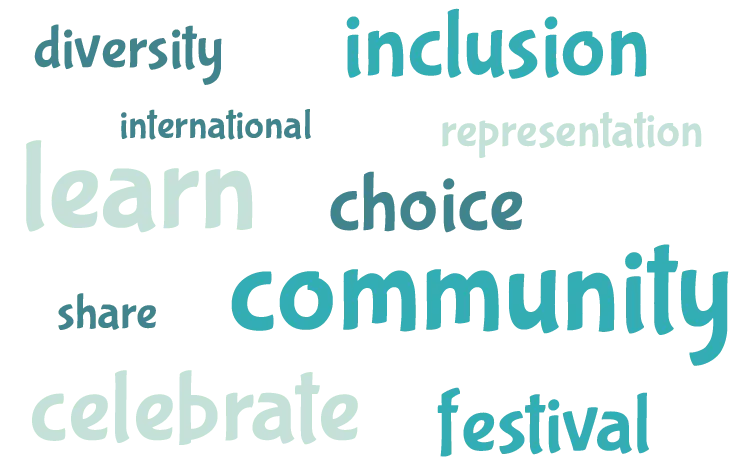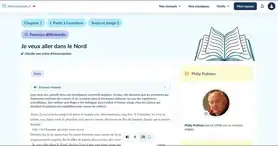Unit 12
Bac
Exam file
Préparation aux évaluations communes
Ressource affichée de l'autre côté.
Faites défiler pour voir la suite.
Faites défiler pour voir la suite.
Évaluations communes
1H30Ressource affichée de l'autre côté.
Faites défiler pour voir la suite.
Faites défiler pour voir la suite.
Compréhension de l'oral Jacinda Ardern's Speech in Auckland
1
Avant l'écoute, lisez le titre ci-dessus et regardez le nuage de mots.a. Sur quoi peut porter cet enregistrement ? Faites trois hypothèses.
b. Trouvez cinq autres mots que vous pourriez entendre dans l'enregistrement.
2
Après l'écoute En rendant compte, en français, du document, vous montrerez que vous avez compris les éléments suivants :
- Le thème principal du document ;
- À qui s'adresse le document ;
- Le déroulement des faits, la situation, les événements, les informations ;
- L'identité des personnes ou des personnages et, éventuellement, les liens entre elles / entre eux ;
- Les éventuels différents points de vue ;
- Les éventuels éléments implicites du document ;
- La fonction et la portée du document (relater, informer, convaincre, critiquer, dénoncer, etc.).
Ressource affichée de l'autre côté.
Faites défiler pour voir la suite.
Faites défiler pour voir la suite.
Picture: Jacinda Ardern, 2019. Video: Jacinda Ardern calls for country to 'choose' diversity at Auckland International Cultural Festival
Ressource affichée de l'autre côté.
Faites défiler pour voir la suite.
Faites défiler pour voir la suite.


Ressource affichée de l'autre côté.
Faites défiler pour voir la suite.
Faites défiler pour voir la suite.
Compréhension de l'écrit
Berlinda Chin calls herself an “involuntary migrant”. When she came to New Zealand in 2000, it was to celebrate her sister's marriage […] not to stay. […]
[She] is now the Director of the Office of Ethnic Communities.
Today Berlinda is a very committed New Zealander – a Malaysian-Chinese New Zealander. […]
“New Zealand has become one of the top five most ethnically diverse countries in the OECD,” says Berlinda. “We have 213 ethnicities – and there are just 196 official countries on the world map.”
During this time Auckland, where immigrants and their children make up more than 55 per cent of the resident population, has come to meet the technical definition of a ‘super-diverse' city (more than one quarter of the total population is from more than 100 different ethnicities). […]
“We need to think about the New Zealand our children and grandchildren will inherit,” says Berlinda. “We want it to be a better place for our future generations.” […]
“To unlock the potential that diversity brings, we need the practice of inclusion,” Berlinda explains. […]
In keeping with its mission, the Office has deliberately set about recruiting a diverse workforce. By Berlinda's count, the Office has about 20 different ethnicities on its staff as well as a broad range of ages and backgrounds.
Berlinda is placing a strategic emphasis on strengthening the engagement of ethnic communities within their neighbourhoods and local communities. “We know that when ethnic communities have positive local interactions, they build a sense of belonging, a sense of identity with their environment. They know they are part of the wider system.”
“We need to become mature and sophisticated in the way we have conversations about discrimination, about racism, about ethnicity, about that simple word ‘identity' ”, says Berlinda.
“We need to think about the mechanisms by which we enable these conversations and we need to think about what we do when we don't like what we hear. Sometimes we will hear perspectives that make us uncomfortable. How do we manage that?” […]
This raises another point: the place of […] the nation's founding document, the Treaty of Waitangi.
“The tangata whenua1 and their relationship to manuhiri2 have to be a part of this conversation,” says Berlinda. “What is the role of Maori in inviting perspectives or in welcoming different people from different countries? How do ethnic communities respond to this invitation with respect? This is one of those bigger questions I often think about.”
New Zealand, says Berlinda, has much to gain from its ethnic diversity.
“When you have people from diverse ethnic backgrounds and a good mix of gender and age, you will get higher levels of productivity and innovation.
“But, and there is a ‘but', it requires the investment of time, energy and effort. […] It takes a ‘whole organisation' approach to unlock the benefits of diversity.”
[She] is now the Director of the Office of Ethnic Communities.
Today Berlinda is a very committed New Zealander – a Malaysian-Chinese New Zealander. […]
“New Zealand has become one of the top five most ethnically diverse countries in the OECD,” says Berlinda. “We have 213 ethnicities – and there are just 196 official countries on the world map.”
During this time Auckland, where immigrants and their children make up more than 55 per cent of the resident population, has come to meet the technical definition of a ‘super-diverse' city (more than one quarter of the total population is from more than 100 different ethnicities). […]
“We need to think about the New Zealand our children and grandchildren will inherit,” says Berlinda. “We want it to be a better place for our future generations.” […]
“To unlock the potential that diversity brings, we need the practice of inclusion,” Berlinda explains. […]
In keeping with its mission, the Office has deliberately set about recruiting a diverse workforce. By Berlinda's count, the Office has about 20 different ethnicities on its staff as well as a broad range of ages and backgrounds.
Berlinda is placing a strategic emphasis on strengthening the engagement of ethnic communities within their neighbourhoods and local communities. “We know that when ethnic communities have positive local interactions, they build a sense of belonging, a sense of identity with their environment. They know they are part of the wider system.”
“We need to become mature and sophisticated in the way we have conversations about discrimination, about racism, about ethnicity, about that simple word ‘identity' ”, says Berlinda.
“We need to think about the mechanisms by which we enable these conversations and we need to think about what we do when we don't like what we hear. Sometimes we will hear perspectives that make us uncomfortable. How do we manage that?” […]
This raises another point: the place of […] the nation's founding document, the Treaty of Waitangi.
“The tangata whenua1 and their relationship to manuhiri2 have to be a part of this conversation,” says Berlinda. “What is the role of Maori in inviting perspectives or in welcoming different people from different countries? How do ethnic communities respond to this invitation with respect? This is one of those bigger questions I often think about.”
New Zealand, says Berlinda, has much to gain from its ethnic diversity.
“When you have people from diverse ethnic backgrounds and a good mix of gender and age, you will get higher levels of productivity and innovation.
“But, and there is a ‘but', it requires the investment of time, energy and effort. […] It takes a ‘whole organisation' approach to unlock the benefits of diversity.”
1. Māori for “people of the land”, it designates local people 2. Māori for “visitor” or “guest”.
“Unlocking the benefits of ethnic diversity”
Ressource affichée de l'autre côté.
Faites défiler pour voir la suite.
Faites défiler pour voir la suite.
Questions
a) Who is Berlinda Chin, where does she come from and what is her position now?
b) What makes New Zealand “super diverse”?
c) What action did Berlinda take in favour of inclusion and diversity? Why, according to you?
d) To her, how do migrants build a sense of belonging?
e) To her, what issue should be tackled in order to make New Zealand a more inclusive place?
f) What is the link between the treaty of Waitangi and recent migration issues?
g) What is the benefit of being a diverse nation according to her?
b) What makes New Zealand “super diverse”?
c) What action did Berlinda take in favour of inclusion and diversity? Why, according to you?
d) To her, how do migrants build a sense of belonging?
e) To her, what issue should be tackled in order to make New Zealand a more inclusive place?
f) What is the link between the treaty of Waitangi and recent migration issues?
g) What is the benefit of being a diverse nation according to her?
Ressource affichée de l'autre côté.
Faites défiler pour voir la suite.
Faites défiler pour voir la suite.
Expression écrite
Choisissez un sujet et répondez-y en anglais en 120 mots minimum.
Write a cover letter to Berlinda Chin for an internship or a summer job at the Office of Ethnic Communities.
Why and how should nations be involved in including minorities and newcomers?
“We are lucky to have the diversity that we have”. Discuss and explain this quote from Jacinda Arden's speech.
Sujet A - Texte
Write a cover letter to Berlinda Chin for an internship or a summer job at the Office of Ethnic Communities.
Sujet B - Texte - Vidéo
Why and how should nations be involved in including minorities and newcomers?
Sujet C - Vidéo
“We are lucky to have the diversity that we have”. Discuss and explain this quote from Jacinda Arden's speech.
Ressource affichée de l'autre côté.
Faites défiler pour voir la suite.
Faites défiler pour voir la suite.
- Sujet A : Respectez la mise en forme d'une lettre formelle.
- Relisez-vous !
- Donnez votre opinion et justifiez en utilisant des exemples et des informations factuelles.
- Utilisez une langue riche.
Une erreur sur la page ? Une idée à proposer ?
Nos manuels sont collaboratifs, n'hésitez pas à nous en faire part.
j'ai une idée !
Oups, une coquille

